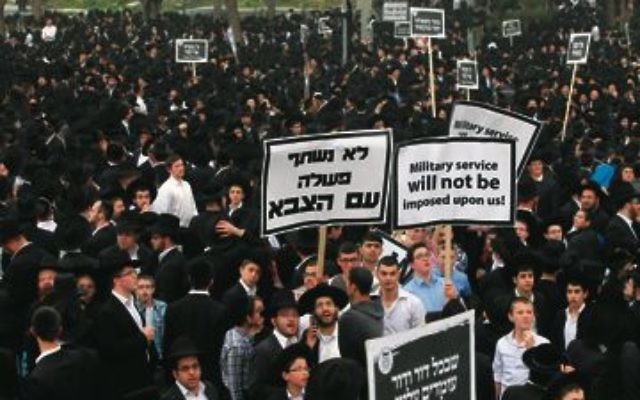Historic Charedi draft law passed
After more than six decades of military exemptions for the ultra-Orthodox, Israel’s parliament has passed a law which will require them to perform national service like other Jewish citizens.
The legislation was part of a package of three important laws, all of which were passed, leaving the Israeli government on a political high. The other laws dealt with the ceding of territory, requiring a referendum if the government ever decides to cede sovereign territory, and the political system, raising the electoral threshold making it harder for small parties to win parliamentary seats.
“We are making history today,” declared minister Naftali Bennett, head of the Jewish Home party, referring to the draft law, which he championed.
Since the establishment of the State of Israel, Charedim have been allowed to study Torah instead of serving in the army. As the Charedi population has grown, this has become a source of anger in the mainstream population.
“This is wrong and we need to fix it … we need them to carry the burden that all of us carry here in Israel,” said Bennett.
Bennett’s coalition colleague Yair Lapid, whose Yesh Atid party electioneered mostly on the draft issue, said that he had helped to bring greater equality to Israel. “To the 543,458 citizens of Israel who voted for Yesh Atid: Today we brought you equality in the burden of service,” he told his supporters via Facebook.
But many Charedi Israelis view the draft law as a disaster. United Torah Judaism politician Israel Eichler said by drawing Charedi men away from yeshivot to army bases it will undermine his community’s culture of Torah study. He even claimed that it is “preferable to Jewish rule that fights to uproot the Torah and persecutes those who study it.”
Idan Miller, an activist who has organised large rallies and petitions in favour of a Charedi draft, told The AJN that the law was an “advance” and a “step in the right direction,” but said that he is reserving judgment until he sees its implementation, which could prove difficult.
Another pro-draft activist, Uri Regev of the Hiddush organisation for religious pluralism, was disappointed. The law actually increases leniencies for Charedim in the short term – until 2017 there are no sanctions against those who do not serve, and men who received exemptions so that they can study are allowed to join the workforce. This goes against the founding principle of the Charedi draft, namely that it only applied to students in full-time study.
One of Regev’s fears is that by passing a law that will eventually criminalise draft dodgers – instead of just imposing economic sanctions – the government has set itself up for a head-on collision with Charedim and has actually made the community more resolute that it won’t serve. “There’s a possibility that the number of Charedim serving may drop, not rise,” he said.
His other fear is that the political landscape could well change before 2017, as a general election is expected to precede implementation. If Charedi parties serve in the next government, they could minimise the law’s impact or even overturn it. “Clearly this is politically driven – namely it will be reopened until after the next election,” he said.
The other two laws passed by the government, as well as the draft law, attracted criticism.
The referendum law, which enshrines the need for a national vote before ceding sovereign territory in Israel’s Basic Laws, the closest thing the country has to a constitution, is a step forward according to Prime Minister Benjamin Netanyahu because “a decision on a diplomatic agreement must be acceptable to the public.” However the left wing said it is a further hurdle to peace deals as it covers Jerusalem and the Golan (but not the West Bank), arguing that voters have their say in elections and don’t need another vote to approve policy.
The Arab community is angry about the raising of the voter threshold, as it is likely to make it more difficult for Arab parties to secure Knesset representation. A coalition of Arab and left-wing Jewish organisations released a statement claiming that the law will lead to the “exclusion of Arab citizens from the field of political representation, and will therefore constitute a fatal blow to the ability of Arab citizens to struggle politically for the realisation of their rights.”
NATHAN JEFFAY


comments